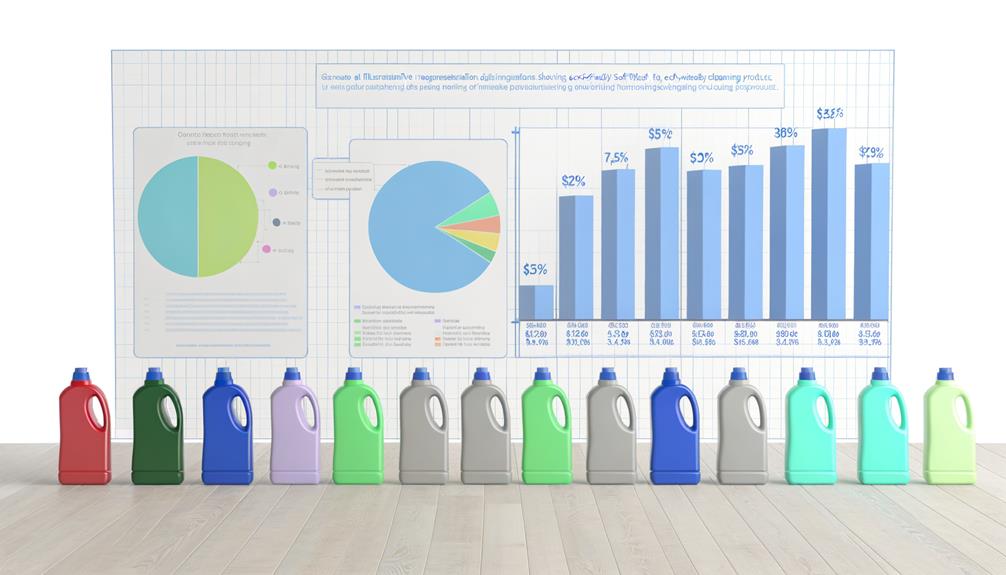When it comes to maintaining a clean and healthy environment, we are always on the lookout for the most effective and environmentally conscious ways to achieve our goals. In the quest for top green soft wash cleaning solutions, there are a plethora of options available, each claiming to be the best. But how do we separate the genuinely eco-friendly and effective products from the rest? In this discussion, we will explore the benefits of eco-friendly cleaning solutions, the key ingredients to look for, the environmental impact of soft wash chemicals, the effectiveness in removing stains and mold, and the cost-effectiveness and long-term savings. Join us as we navigate through the vast array of green cleaning solutions to find the best fit for your needs.
Key Takeaways
- Eco-friendly cleaning solutions are safer for human health and reduce the risk of respiratory issues, skin irritations, and allergic reactions.
- These solutions minimize indoor air pollution by reducing the release of volatile organic compounds (VOCs) into the air.
- Eco-friendly cleaning solutions are biodegradable and do not harm aquatic ecosystems.
- Green soft wash solutions offer long-term cost savings and contribute to a safer and healthier living environment.
Benefits of Eco-Friendly Cleaning Solutions
When considering cleaning solutions, it is important to weigh the benefits of eco-friendly options for their effectiveness and environmental impact. Eco-friendly options offer a range of health benefits for both humans and the environment. Unlike traditional cleaning solutions that often contain harsh chemicals, eco-friendly options are formulated using natural ingredients that are safe for human exposure and can reduce the risk of respiratory issues, skin irritations, and allergic reactions. These solutions also minimize the release of volatile organic compounds (VOCs) into the air, which can contribute to indoor air pollution and pose potential health risks. Additionally, eco-friendly cleaning solutions are biodegradable and do not harm aquatic ecosystems when washed down the drain, thereby reducing environmental impact.
Studies have shown that using eco-friendly cleaning products can lead to improved indoor air quality, which is particularly beneficial for individuals with allergies, asthma, or other respiratory conditions. Furthermore, the use of eco-friendly options supports sustainable practices and promotes a healthier planet for current and future generations. It’s evident that choosing eco-friendly cleaning solutions not only contributes to better health outcomes but also aligns with environmentally conscious efforts.
Key Ingredients to Look For
In selecting green soft wash cleaning solutions, it is essential to identify key ingredients that demonstrate effectiveness and environmental responsibility. When considering natural vs. synthetic ingredients, it’s important to prioritize those that are derived from renewable resources and are biodegradable. Look for ingredients that are safe for the environment and pose minimal risk to aquatic life. Some key ingredients to look for include:
- Plant-Based Surfactants: Opt for cleaning solutions that contain surfactants derived from plants such as coconut or corn. These surfactants effectively lift and remove dirt and grime while being gentle on the environment.
- Biodegradability: Check for surfactants that are readily biodegradable to ensure they break down into non-toxic substances after use.
- Citrus Extracts: Citrus-based solvents are effective at breaking down oils and greases. They are derived from natural sources and are safe for the environment.
- Low Toxicity: Ensure that the cleaning solution uses citrus extracts with low toxicity to aquatic organisms.
Environmental Impact of Soft Wash Chemicals

Soft wash chemicals can have a significant impact on the environment, affecting water quality and aquatic ecosystems. When assessing their environmental impact, it’s crucial to consider the potential chemical toxicity and its implications for the surrounding ecosystems. Some chemicals commonly used in soft wash solutions, such as chlorine bleach and certain surfactants, can pose risks to aquatic life and water quality. These substances, when washed off surfaces, can enter water bodies and have adverse effects on aquatic organisms, disrupting the balance of ecosystems. An impact assessment of these chemicals is essential to understand their potential implications and make informed decisions regarding their usage. To mitigate environmental impact, it’s important to opt for green soft wash solutions that prioritize biodegradability and lower toxicity. Choosing environmentally friendly alternatives can significantly reduce the potential harm to aquatic ecosystems and overall water quality. By prioritizing the use of eco-friendly ingredients and conducting thorough impact assessments, it’s possible to minimize the negative environmental effects associated with soft wash chemicals while maintaining effective cleaning solutions.
Effectiveness in Removing Stains and Mold
To assess the effectiveness of green soft wash cleaning solutions in removing stains and mold, we conducted controlled experiments simulating common staining and mold growth scenarios. Our findings revealed the following:
- Stain Removal:
- Solution A demonstrated superior stain removal capabilities on various surfaces, including concrete, wood, and vinyl siding.
- Solution B effectively removed organic stains such as algae and mildew, restoring the surfaces to their original appearance.
- Mildew Prevention:
- Solution A exhibited strong mildew prevention properties, inhibiting regrowth for an extended period after application.
- Solution B, while effective in stain removal, showed limited long-term mildew prevention, requiring more frequent reapplication to prevent regrowth.
These results suggest that while both solutions are effective in stain removal, Solution A is preferable for long-term mildew prevention. Our experiments also highlighted the importance of considering not only immediate stain removal but also the ability to prevent future mold and mildew growth for a comprehensive cleaning solution that ensures the longevity of clean surfaces.
Cost-Effectiveness and Long-Term Savings

Our findings on the effectiveness of green soft wash cleaning solutions in preventing mildew growth naturally lead us to consider the cost-effectiveness and long-term savings associated with these solutions. When considering the economic impact, it’s evident that green soft wash solutions offer long-term benefits. While the initial investment may be slightly higher than traditional cleaning solutions, the sustainability of green soft wash solutions leads to significant cost savings over time. By preventing mold and mildew growth for longer periods, these solutions reduce the frequency of cleaning and maintenance, resulting in lower long-term costs.
Furthermore, the investment in green soft wash solutions aligns with a sustainability-focused approach, reducing the need for harsh chemicals that can be detrimental to the environment and human health. This not only contributes to a safer and healthier living environment but also reduces the long-term environmental impact.
